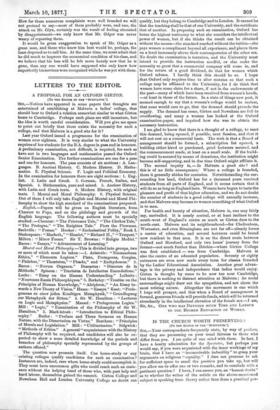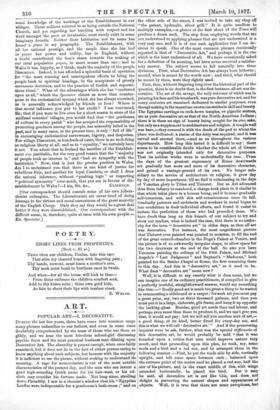IS THE CHURCH WORTH PRESERVING?
[TO TRH EDITOR OF THE "SPECTATOR.") SIII,—Your correspondents frequently state, by way of preface, that they are presuming on your usual fairness to those who differ from you. I am quite of one mind with them. In fact, I have a hearty admiration for the Spectator, but perhaps you would say, if you were acquainted with the inner workings of my brain, that I have an "inconceivable imbecility" to grasp your arguments on religious "equality." I dare not presume to ask for sufficient space to assail the position you take up, but will you allow me to offer one or two remarks, and to conclude with a pertinent question ? I have, I can assure you, an "honest doubt" as to whether the writer of the article on the above-mentioned subject is speaking from theory rather than from a practical per- soual knowledge of the workings of the Establishment in our villages. -Those millions referred to as being outside the National Church, and yet regarding her teaching with respect and her work amongst the poor as invaluable, must surely exist in some imaginary Arcadia. Neither their habitation nor its name has found a place in my geography. The Establishment, with all her national prestige, and the ample time she has had to prove her power and utility, has in England, without a doubt contributed the lion's share towards the making of our rural population pagan, in more senses than one ; and in Wales it has, happily, as I think, made the majority of the people Dissenters. Indeed, it has afforded a splendid basis of operation for "the most cunning and unscrupulous efforts to bring the people back to spiritual bondage, to the acceptance of grossly erroneous doctrines, and to the practice of foolish and supersti- tious ritual." What of the advantages which she has "conferred upon us all," which the Spectator claims as more than counter- poise to the ecclesiastical tyranny which she has always exercised, as is generally acknowledged by friends or foes? Where is that moral influence you put to her credit? I am convinced, Sir, that if you were to live even for a short season in some of the Midland counties' villages, you would find that "the gentleman Of culture in every parish" who has accepted the responsibility of promoting goodness among the people, has miserably failed in the past, and in many cases, at the present time, is only "full of life" in encouraging ecclesiastical narrowness, bigotry, and despotism. For village Dissenters, in hundreds of cases, there is no such thing as religious liberty at all, and as to "equality," we certainly have it not. You admit that in Ireland the sacrifice of the Establish- ment was justifiable, for the very good reason that the "majority of people took no interest in" and "had no sympathy with the institution." Now, that is just the precise position in Wales. .&nz I to understand you that there is one kind of justice for rebellious Erin, and another for loyal Cambria, or shall I draw the natural inference, without "pushing logic" or respecting 64 political symmetry" over-much, that you are in favour of dis-
establishment in Wales ?—I am, Sir, &c., CELDRYCH.
[Our correspondent should consult some of his own Libera- tionist colleagues. The Liberationists are never tired of doing homage to the virtues and moral earnestness of the great majority of the English Clergy. Only they say they would be a great deal better if they were disestablished. Our correspondent with the difficult name, is, therefore, quite at issue with his own people.— En. Spectator.]



































 Previous page
Previous page